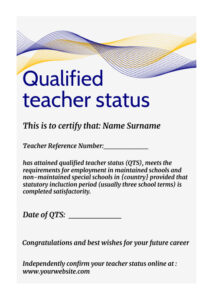Teach In The UK For Nigerians

How Nigerian Teachers Can Teach In The UK; All You Need To Know About QTS
Teachers from South Africa, Ghana, Zimbabwe, and Nigeria with equivalent qualifications to their British counterparts and at least one year of teaching experience has a rare opportunity to work in the United Kingdom beginning February 2023.
The offer will also be extended to teachers from Ukraine, Singapore, Jamaica, India, and Hong Kong under the Qualified Teacher Status (QTS) programme as of February next year.
What is QTS?
Qualified teacher status (QTS) is what you need to teach in most primary and secondary schools in England. It is a confirmation that you have the right training and meet the standards required to be a teacher. QTS is a teaching standard that is respected across the world.
QTS offers Teachers from these countries to teach in majority of primary and secondary schools in England.
QTS is the evidence that one has the necessary education and meets the criteria necessary to be a teacher.

What happens when you get QTS?
SALARY PER ANNUM
As part of retaining teaching staff, the UK intends to have a base salary of about
Countries
Only four African countries are the first to be considered for QTS. They are Ghana, South Africa, Zimbabwe and Nigeria.
Teachers from the European Economic Area, Gibraltar, Australia, Canada, New Zealand, Switzerland, the US, Scotland, and Northern Ireland have enjoyed QTS in the past.
According to the UK Government “Teachers from all eligible countries will have to show they meet a consistent set of criteria for the award of QTS. Over time, this route will be opened to qualified teachers from every country outside the UK,”
The teachers can be recruited directly from their countries of origin provided their employer sponsors a critical skills visa for them.
The visa will be used along with the general or immigration visa.
The UK government said in due course this type of visa would be opened to teachers from all over the world.
The demand for teaching professionals had risen above pre-pandemic levels by mid-summer and the beginning of autumn.
Do you get paid during QTS?
Is QTS higher than PGCE?
Do people fail QTS?
Do you need a degree to get QTS?
Can you teach with just a QTS?
How long does QTS take to come through?
Candidates will need to demonstrate that they are able to meet all the standards for QTS without the need for further training. Once accepted, you should expect to be recommended for QTS within 12 weeks.
How important is QTS?
Can I teach any age with QTS?
Is QTS a Masters?
Routes to QTS
There are 4 routes to qualified teacher status for teachers and trainees outside the UK:
- apply for QTS through the Teaching Regulation Agency
- apply for assessment only QTS
- apply for teacher training in England
- apply to train for international qualified teacher status (iQTS)
Your eligibility for each route will depend on:
- where you qualified
- whether you already have teaching experience
- your personal circumstances
Apply for QTS through TRA
You can apply for QTS through the Teaching Regulation Agency (TRA) if you have a teaching qualification from:
- the EEA
- Gibraltar
- Australia
- Canada
- New Zealand
- Switzerland
- the USA
- Scotland
- Northern Ireland
You can apply if you:
- submit evidence that you’re recognised as a teacher in the country where you qualified
- are not prohibited or restricted from teaching by a professional sanction against you
When you apply to the TRA for QTS you do not need to:
- pay a fee
- undergo any further training
- visit the UK
Apply for QTS in England and newly eligible countries
From 1 February 2023, teachers who qualified in the following 9 countries will also be able to apply to TRA for QTS:
- Ghana
- Hong Kong
- India
- Jamaica
- Nigeria
- Singapore
- South Africa
- Ukraine
- Zimbabwe
This change is part of the launch of a new service, apply for QTS in England. From 1 February 2023, the way we award QTS will change.
Apply for assessment only QTS
If you’re not eligible to apply for QTS through TRA, assessment only QTS may be the most appropriate route for you.
Assessment only QTS means experienced teachers with a degree can gain QTS without doing a teacher training programme. You can apply to a UK government-approved teacher training provider in England for an assessment showing you meet the standards for QTS. You do not need to visit the UK to be assessed and gain QTS.
Working as a teacher while you undergo assessment only QTS
You can work as a teacher in England and earn a salary while you’re assessed for QTS.
The 4-year rule means you can find a teaching job and apply to a teacher training provider offering assessment only QTS in the region of England where you work. Your employing school can support you with this.
When you apply for assessment only QTS you’ll:
- have to pay a fee
- not have to undergo any further training
- not have to visit the UK
Can a Nigerian teacher teach in UK?
How much does QTS cost?
Home 2022/23 – £2,700
The fees need to be met by the candidate or their supporting school or a combination of both. The cost covers the following: application and initial screening; initial assessment day (interview at school with head teacher and university tutor)
Qualifications and experience you’ll need to be eligible for an assessment only QTS
To apply for assessment only QTS, you do not need a formal teacher training qualification.
However, you must have:
- a minimum of 2 years’ teaching experience
- a first (bachelor’s) degree from a UK or non-UK university
- an English language qualification which is the same standard as a grade 4 GCSE (General Certificate of Secondary Education)
- a maths qualification which is the same standard as a grade 4 GCSE
- to teach children aged 3 to 11 in primary school, a physics, chemistry or biology (science) qualification which is the same standard as a grade 4 GCSE
A GCSE is an academic qualification awarded for examinations in England, usually taken at age 16.
International qualifications
If your qualifications come from a non-UK institution, your assessment only teacher training provider may want to see a ‘statement of comparability’ showing how they compare to UK qualifications.
You can call us on 0800 389 2500 for:
- guidance on the UK equivalents of your qualifications
- a free statement of comparability from UK ENIC once you’ve submitted your application, if your provider asks for this
Your teaching experience must:
- consist of time spent teaching (as opposed to other responsibilities in a school)
- have taken place in 2 separate schools (not 2 classes within the same school or 2 school sites within the same organisation)
- demonstrate you’ve taught young people from a range of different backgrounds
- demonstrate you’re familiar with different approaches to teaching, learning and school management
Your teaching experience can have been:
- gained in any type of school, for example, international schools, schools teaching the International Baccalaureate, and state-maintained schools outside the UK
- spent teaching a non-English curriculum (though you may need to show you have knowledge of the subjects taught in the English curriculum)
- divided between 2 school settings as long as you have 2 years’ teaching experience in total
British international school organisations
British international schools provide suitable experience for teachers wishing to apply for assessment only QTS. However, it is not a requirement to gain your experience at a British international school. Reputable British international school organisations include:
“To apply for assessment only QTS, you do not need a formal teacher training qualification. However, you must have: a minimum of 2 years’ teaching experience; a first (bachelor’s) degree from a UK or non-UK university an English language qualification which is the same standard as a grade 4 GCSE (General Certificate of Secondary Education); a maths qualification which is the same standard as a grade 4 GCSE to teach children aged 3 to 11 in primary school and a physics, chemistry or biology (science) qualification which is the same standard as a grade 4 GCSE,” the notice reads.
For more information on how to apply, kindly check here.
Conclusion
Teachers in Nigeria can take now take advantage of the QTS opportunity from February 2023 to begin the process. We hope this information will be useful. Kindly read and share.
Thank You




